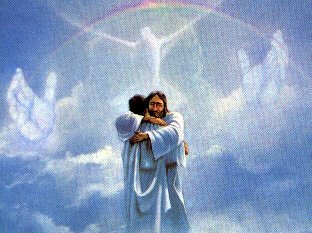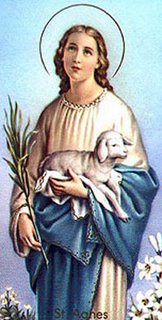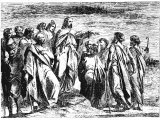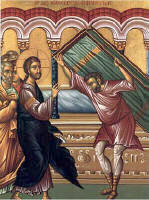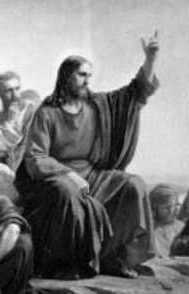 Solemnity of the Lord’s Epiphany
Solemnity of the Lord’s Epiphany
Mt 2:1-12
How many kings are mentioned in the Gospel today? Two. Yes, only two: King Herod and Jesus, the newborn King of the Jews.
But we are very accustomed to greeting one another on this day, “Happy Three Kings!” There are no three kings in the Gospel today; only two; and they are certainly not happy. King Herod is not happy about the news concerning the newborn King of the Jews, and, in utter madness, he ordered the massacre of all boys from two years old and below found in his kingdom. Jesus, the newborn King of the Jews, certainly is not happy about the insanity of King Herod.
The men who came from the East to worship the newborn King of the Jews were described as “wise men”, not kings, magi, not royalties. Most probably because of their priceless gifts, they are thought by many people even today as kings. Moreover, the headcount says that some wise men, not three wise men from the East arrived in Jerusalem to worship the newborn King. Yes, there were three kinds of gifts – gold, frankincense, and myrrh; but there is no basis to peg the number of the visitors to three.
The correct title of today’s solemnity is “The Lord’s Epiphany”, not the “Feast of the Three Kings”. The liturgy today focuses on the fact that Jesus was born for all men and women from every place and time. The Lord was revealed to all nations because God wishes that all men and women be saved and to the knowledge of truth. The highlight should be the Lord, not some wise men or earthly kings.
I had a sad experience last Christmas. I went to pray in the parish church of one of plush subdivisions of Metro Manila. After praying I went closer to the beautiful, expensive, imported and life-size Christmas crèche at the foot of the sanctuary, I noticed that something is missing among the usual characters. There was the Blessed Mother, St. Joseph, Baby Jesus, and the three wise men, but the shepherds were absent. Immediately I wondered if the shepherds were intentionally left out by that community known for its residents who are mostly, if not all, rich and famous. Could it be that they identify with the so-called “Three Kings” but not with the shepherds who, in the time of Jesus, were known to be poor and illiterate, and considered social-outcasts? I really felt sad. Because it was Christmas Eve when I prayed in that church, I even caught my self saying, “My goodness, the wise men got here first before the shepherds! This community must be celebrating a different Christmas.”
Because today’s feast is commonly regarded as the “Feast of the Three Kings”, some people may think that today is the Christmas of the rich because so-called “kings” arrived in Bethlehem while December 25 is the Christmas of the poor because the only visitors of the Holy Family on the night Jesus was born were poor shepherds. Certainly, this kind of thinking or even impression is wrong. Christmas is for everyone. Jesus is born for all of us, rich and poor, wise and unwise, holy and unholy, Jews and Gentiles alike. This is precisely the reason for today’s celebration. God reveals Himself to all humankind and gives His only Son to each of us. Today is God’s epiphany more than the feast of three kings.
The wise men, whom many came to regard as kings, were not wealthy at all. On the contrary, the epiphany of God sheds light on their own poverty. Like the shepherds, who were first to worship the newborn King, those so-called “Three Kings” were poor. But having found Jesus, they were enriched and made even wiser.
In the eyes of God, we are all poor and so He gives us His Son to make us truly rich. “He who has the Son has life; he who does not have the Son of God does not have life,” so says 1 Jn 5:12.
The wise men were poor because they were searching. True wealth puts an end to all searching. This is the reason why we can never we contented with whatever we have and know while here on earth. Life in this world is a life of continuous search. The wise men were searching for the newborn king of the Jews because they felt, if not yet knew, that finding the prophesied birth would bring them greater joy. In the same manner, we are all searching for meaning in our lives, that will bring greater joy, true joy, lasting and never-ending joy. We always embark on a quest for joy, hoping that we are treading on the right track. But we are poor until we have found Jesus, the Way.
The wise men were poor because they did not know everything. They were wise but they did not know everything. Their wisdom made them recognize the sign of Christ’s birth but they had to rely on the guidance of a star; and when the star was gone for sometime, they had to ask other people, including the infamous King Herod. The wise men, like all men and women, also had their deficiencies despite all their wisdom. Like all of us, they had to be helped and led, to be taught and enlightened. And we are poor until we have known Jesus, the Truth.
The wise men were poor despite an impressive list of what the gifts they brought Jesus. Indeed, gold, frankincense, and myrrh are expensive gifts but still gold, frankincense, and myrrh have equivalent prices. That gold, frankincense, and myrrh are priceless is only in a manner of speaking. True wealth is having what money cannot buy. And the truly wealthy person is he or she who gives what money cannot supply. Unless we are live and love like Jesus, the Life, we are poor.
Today’s epiphany is not only God’s revelation of Himself; it is also the manifestation of who we really are without God. We may be living in the most luxurious village in the city, but unless God dwells in us, we are poor. There used to stand a billboard along the South Luzon Express Way, enticing passersby to procure properties in an exclusive subdivision. The billboard reads: “Where you live defines who you are.” This advertisement is very unacceptable, misleading, ridiculous, and even scandalous. No matter what we have and who we are, we remain utterly poor without Jesus. The people around us may think we are royalties or call us “wise”, but, let us not deceive our selves – we know we are paupers and fools without the Lord.
As we see in Jesus the God whom otherwise we cannot see, we learn that it is for our sake that God became poor so that we might become rich. Jesus came to share in our humanity that we might come to share in His divinity.
The visitors from the East were not kings but wise men. Like the rest of humanity, they were poor in their own way. They were wise through because despite their own poverty, they have searched for, been led to, and have worshiped Jesus who is the Way, the Truth, and the Life. And they were even wiser because having found, reached, and received Jesus, they went home through another route. They arrived in Bethlehem wise but poor; they left it enriched and even wiser. As another the blessed season of Christ’s birth ends today, we go back to our usual, day-to-day affairs; the route we take in our return to the ordinariness of life will show if we, too, have been enriched and made wiser by the kind of Christmas we have celebrated.








